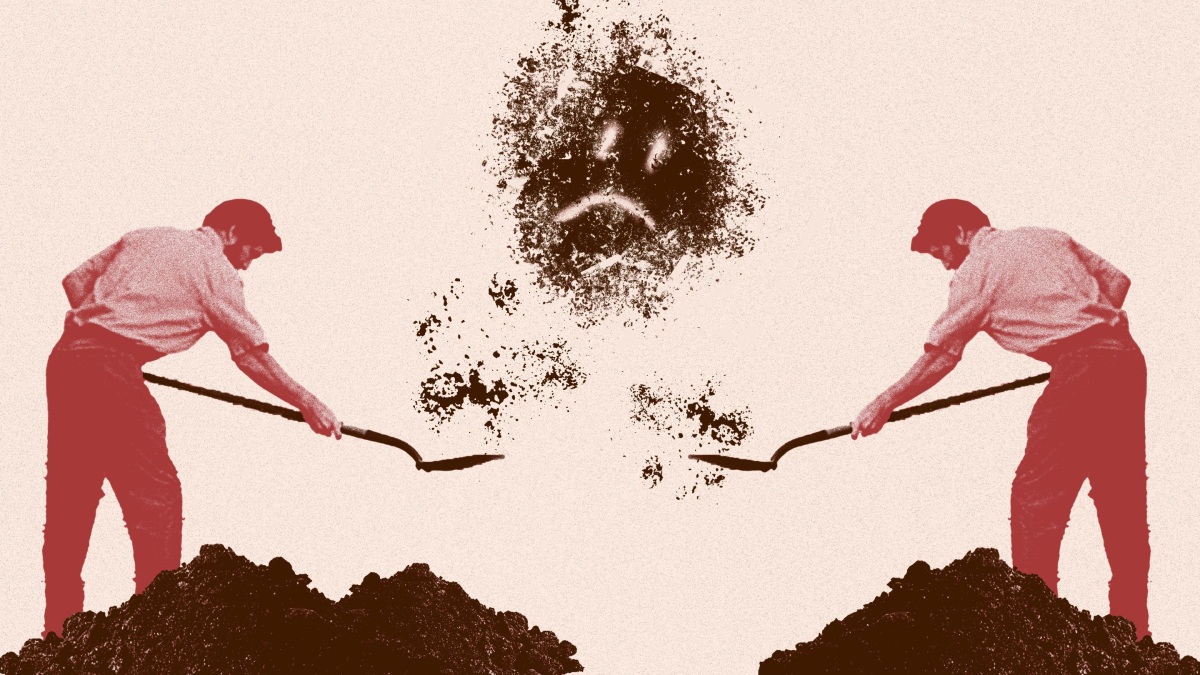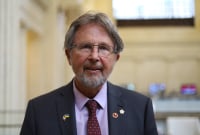Support strong Canadian climate journalism for 2025
Last month, a video was posted to Pierre Poilievre's Facebook page accusing the federal government of causing high food prices and driving farmers to ruin. The post on the Tory leader’s page laid the blame on "proposed fertilizer cuts" that would force Canadians into an "irresponsible" reliance on expensive imported food.
The video was misleading. The federal government last year announced it was developing a voluntary plan to reduce nitrogen fertilizer emissions by 30 per cent by 2030. Mandatory restrictions on the chemicals were never in the works; instead, farmers would be encouraged to help out by using more efficient fertilizers or using less by changing their farming techniques.
Nitrogen fertilizers account for about two per cent of global greenhouse gas emissions — about the same as aviation. In Canada, they account for about a quarter of agricultural emissions and are the only source of emissions in the sector that is growing.
Within weeks, the 40-second clip posted on Poilievre’s page was viewed over 35,000 times and received more than 7,500 interactions, making it among the most popular posts about fertilizer on the platform this year. Interactions are a metric used by Facebook parent company Meta that combines a post's likes, comments and shares.
Disinformation and conspiracy theories about Canada’s fertilizer reduction strategy have run rampant online, since the release of a doomsday report last year by Canada’s $23-billion fertilizer industry. The report claims the plan will cost farmers $48 billion by 2030 and slash yields of our major crops. Since then, conservative politicians and advocacy groups linked to Canada's far-right and fossil fuel lobby, have been posting erroneous information that ranges from greenwashing to flat-out disinformation about the government fertilizer plan, a Canada's National Observer investigation has found.
Nitrogen fertilizers are primarily made from natural gas. As the world tries to reduce gas production and consumption, the chemicals are poised to become increasingly important to the survival of gas companies.
Canada's National Observer looked at Facebook posts containing the word "fertilizer" posted by Canada-based Facebook pages over the past year using Meta's proprietary search engine Crowdtangle, which captures most of the more than 1,000 posts. Of the 120 that garnered the most interactions, 64 per cent were posted by conservative politicians or political parties, right-wing populist groups and pro-fossil fuel groups about the federal fertilizer emissions reduction plan.
Poilievre tops the list of 20 politicians and political parties who posted on the issue, garnering nine of the top 120 posts. Those messages framed the federal emissions reduction plan as an effort to restrict fertilizer use and an attack on farmers that would increase the cost of food for Canadians.
The federal government has not proposed restrictions on fertilizer use and this summer signed a $2.5-billion deal with the provinces to subsidize Canadian farmers. The price of food is primarily shaped by global forces, meaning associated soaring food prices are largely out of Canadian control.
Some comments by Conservatives went even further. Manitoba MP Dan Mazier’s Facebook page shared a video claiming the fertilizer plan was an "attack on farmers" that would "kill a foundational sector like agriculture" after first "shutting down our oil and gas industry." The federal government continues to offer generous subsidies to farmers and the oil and gas industry.
Canada's National Observer did not receive a response to a request for comment from Poilievre's office by deadline. A spokesperson for Mazier did not address specific questions about the MP's claims about the plan.
Thirty of the top-performing posts were made by right-wing populist groups or media outlets, many with a track record of attacking the Trudeau government. This list includes groups like Ontario Proud, which holds itself out as a grassroots community group but operates anonymously and is part of a family of similar pages linked to conservative operative Jeff Ballingall and right-wing media outlet True North.
For instance, on Aug. 27, a post by the group Alberta Proud warned the federal government to "keep your hands off our farmers" by backing off its "demand" that they reduce fertilizer emissions and use, and highlighted a cartoon repeating a conspiracy theory that the plan is a plot to make people eat crickets and starve them into submission.
Alberta Proud describes itself as "a group of citizens concerned about Alberta's future within Canada" but does not publicly list its members or staff.
The post received over 8,000 interactions, including about 3,200 shares.
Pro-fossil fuel groups received the highest number of interactions. Take an Aug. 15 post by Canada Action, a group that bills itself as an advocate for Canada's natural resource industries. It does not publicly list its members or staff. The post asked followers to support farmers by signing a petition against the fertilizer emissions reduction plan. It received nearly 17,000 interactions.
The confluence of these groups over the fertilizer emissions reduction plan doesn't surprise Simon Fraser University communications professor Shane Gunster, who studies online links between right-wing groups, politicians and natural resource industry lobbies.
"Clearly there are a cluster of groups — fossil fuel industry supporter groups, right populist groups, right-wing politicians, etc. — that have latched on to this issue as an effective one to whip up outrage against Trudeau and the federal government," he wrote in an email.
Farmers had largely been overlooked by these right-wing groups until recently, but Gunster said their sudden focus on fertilizers suggests they think food-related issues can generate more support for their broader political goals than less publicly "appealing" industries like mining or oil and gas.
Right-wing populism works by politicians finding groups that are "allegedly victimized by those in power" and claiming to stand up for them. Politicians spreading inaccurate information about the federal fertilizer plan then saying they will "stand up for farmers" against it is "emblematic" of this process, Gunster wrote.
Their message is amplified further by the tight links between the different groups. He pointed, for instance, to a July 27 post where Poilievre's Facebook page posted the link to a Toronto Sun column slamming the federal plan. The piece was written by Anthony Furey, a columnist for the paper who also writes for True North.
"This is exactly how the polarizing echo-chambers that now dominate our media and public sphere are built and sustained, pulling audiences into right-wing networks in which the merchants of fake populism in media and politics reinforce each other’s appeal," Gunster said.
Groups and politicians turning their focus onto the proposed fertilizer emissions reduction plan comes as no surprise to Darrin Qualman, the National Farmers Union director of climate crisis policy. For decades, right-wing politicians have promised farmers that fewer regulatory measures would boost their incomes. While many of those changes have been implemented by conservative, market-friendly governments, they haven't fixed problems like farm debt, high land prices and widespread consolidation.
"The problem for right-wing candidates… is that after decades of blaming farm problems on gov’t agencies and regulations, so little of that policy and infrastructure is left that they are now having a hard time finding agricultural issues to run on — little to whip up rural support," Qualman explained via email.
Thus the push by politicians like Poilievre and right-wing groups aligned with his message to frame the government's voluntary emissions reduction plan as a mandatory cut in fertilizer use that will harm farm incomes and food security.
"Farmers are being pushed to have a false fight about fertilizer because those on the right have few agricultural issues or ideas to talk about," he said.






Comments
Thanks for the careful analysis. I wonder if it would be feasible to have natural nitrogen fertilizer on a large scale. It seems to me that there must be enough feather meal, blood meal, hoof & horn meal as well as fish meal and crab meal to do so.
No-till agriculture as practiced in Canada has already reduced the demand for external nitrogen considerably and a more wide spread use would reduce it further. Eating less meat would also contribute by reducing demand for animal feed (protein aka nitrogen) in our food production system. These are passive responses that avoid external nitrogen and associated costs via substitution of beneficial agricultural and food practices rather than by banning use. Unfortunately such reasoning won't cut across these provocative right wing videos, which are motivated by political agit-prop, not agricultural practices.
That stuff gets processed and packaged as livestock feed ... or pet food for seniors.
But if even a small fraction of the BS coming out of CAPP, the Gas Lobby and Poilievre got spread on the fields, there'd be little need for alternatives.
Try podcast called BETWEEN THE ROWS July 28 2022, for an interesting interview. Research well under woy for an alternative to natural gas to make fertilizer.
Agribusiness does much evil to save a dime here and there. We have very, very cheap food, so cheap we can afford to waste nearly half of it. Instead of making the food cheap by low standards, cruelty, environmental damage, we could just subsidize the poor to buy it, and let the price of it go up to where it supports an ecological, moral, humane food industry. Prices would probably not even rise that much.
The con party has no intelligence to dazzle us with brilliance so they try baffling us with bulls*t.
Terrific research here, much appreciated. On a (somewhat) related note, what is "natural" about the fossil fuel we call "natural gas." What makes "natural gas" natural? Why isn't oil isn't called "natural" oil?
Thanks for this valuable analysis Marc!
Thank you for the informative journalism (keep doing what you do!) and thanks to everyone for such great comments!
Another angle to this story, I think, is that farmers are going to be amongst the most hard-hit workers and business owners when considering the damaging impacts of climate change. Conservatives may be trying to buy their loyalty over this issue, by posing as protectors and friends of agribusiness, when in fact, they are the most hand-in-glove political group driving us all towards destruction of our climate. Many of our industries will suffer damages and costs due to worsening climate change, and no one will be able to find a safe and protected environment, but the hardest hit must surely be our farmers, due to increasingly unpredictable and severe and volatile weather events, related to climate heating. I have no doubt that there's an element of Conservative strategizing to try to silence and handcuff famers, and prevent their action and voices on climate change, because that may then focus a lot of the blame for climate devastation on Cons and their seemingly unendable love affair with the fossil fuel industry and its products. There's no love like you first love, I guess. Cons are seemingly happy to drive the destruction of their own children's futures, rather than concede they've been wrong all along about climate science and fossil fuelists' culpability.
Perusing the FB compilation graphically reveals strong parallels between Country Music production and partisan political propaganda from the Canadian neo-right, especially the respective narratological exercises which, like any entertainment industry, affect searches for the next big thing—in Country Music, the ‘hook’ that will attract and hold attention whence a top-ten ‘hit’ might be realized, and in partisan propaganda the talking points coordinated to look like provocative news. The big reveal for me is the extent either endeavour resorts to fantasy, rote repetition, hipness and the soppiest of maudlin tropes in order to catch and hold attention and, overtly, to recruit proselytes to notions of “a way of life” invariably threatened by shadowy forces, all in the twangy key of Q.
I must confess my affection for Country&Western music—Old School, Ernest Tub, Merle, Johnny Cash, Hank Sr, to be sure. I’m from farm country, stuff was on the pickup truck radio all through my raising; now it’s indelibly engraved on my mind like filigree on a gun-stock. I play lead chickin’-pickin’ and faux pedal-steel bends on my Telecaster when, from time to time, I’m lucky enough to gig or record with Conrad F Campbell’s Heavy Haulers or, lately, his Luxury Sedans. Although in the style of those corny, familiar old nuggets we cover, Conrad’s original lyrics are both blunt and subtle, with clever entendres exponentially exceeding the number of George Jones’, affecting spoof and perforce almost entirely fabulated —or ‘just made up.’ Real C&W in a different, fun way, it’s no slight of one of our greatest cultural icons. Rather, I t’s kinda like where I come from, every eight year-old boy gets a .22 rifle for Christmas—like me—but otherwise I support federal gun regulations and, the great majority of my time, I play Delta Blues, Negro Spirituals, and trade union songs at home and on the beach.
But, like the sappiest tear-jerker C&W, we do have and affect subjective lament. No, not govmint reg’lations ‘n’ fert’lizer, but rather the sorry state of New Country Music. Lately on a road trip I forced myself to listen to any of the burgeoning number of New Country radio stations, snap-tracked, bass-boosted, dumb-downed numbers of narrow, almost inert melody and, such as they are, harmonies proudly auto-tuned. Among de-rigeure tropes of pickups down by the “crick”, short cutoffs, lachrymose bro-dom, addled patriotism and loyalty torn between church and grandma’s apple pie on the one spur, and big belt-buckle pursuit of cowgirls on the other is the the constant appeal for relief from these petty dilemmas, whether from liturgy, liquor or lust. It is gallingly infantile. It’s braggadocio wrapped around utter insecurity is hopelessly juvenile, and it frequent invitation to fight for “rats” (that’s “rights,” in Canadian—well, Eastern, anyhow…) is cringingly adolescent. (Qv: Bro-Country and, worse, Country-Rap music videos —cowboy hats ‘n’ bling, beers and tatted beer bellies bobbing up and down to hip-hop-caricatured beats down by the rope-swing, young blonde women in ponytails and cutoff jeans—and not a coloured person in sight —is absolutely appalling.)
Which occurred to me that these conservative-proud propagations have adopted the very same hit-strategy as C&W used to fabulate quaint musical stories for toe-tapping or square dancing back in the good old days, but which New Country has dumbed-drown to an inane, nauseating, repetitive, sub-hip-hop drone. Neo-right rhetoricians, I agree, are scrapping the bottom of the feed bag for topical subject matter with any much relevancy and, so, now resort to New Country form and Qanada Proudannon tropes. And just like modern music production in the internet age, the singer and the songwriter needn’t even be on the same continent, and the recording engineer need only use apps on cher phone in cher basement bedroom to achieve production “values.”
It’s as if Poilievre is organizing virtual gin-bucket rallies to stage mindlessly-deafening beatbox hypnosis and designer ecstasy. However, his casting of truckers into the caterwaul of privilege deprived is less anachronistic anomaly, ala Red Sovine or Dave Dudley, than identification with a most valuable contemporary market: the less-than iconic semi-trucker who spends a lot of time alone on the long haul with nothing but cher thoughts, talk-show radio and, of course, some kind of country music.
The objective aims to profit from anger against Poilievre’s partisan rivals so-ginned. The challenge is to husband it when the threshold between reality and fantasy has already been breached: how absurd may one push it? Today it might be fertilizer but, with two years until the next scheduled legation, the question is, just like in pop-music production: what will be the next big thing or the next smash hit-maker?
Perhaps Poilievre is proudly probing propaganda potential, practicing with dummy tropes otherwise easily refuted, getting ready to switch labels while deftly maintaining the same level of peeve. But it risks ridicule.
Anyway, how long can anyone take listening to New Country before chi changes the channel?
What did we expect from Pierre Populism? Like the 4 Central Canadian Provinces Premiers, it seems impossible we could expect a balanced rational critique. ON , MB , SK AND AB as well as the Canadian Conservative Party seem to think it is always us vs them
has Poilievre uttered one fact or solution since becoming leader . not a chance